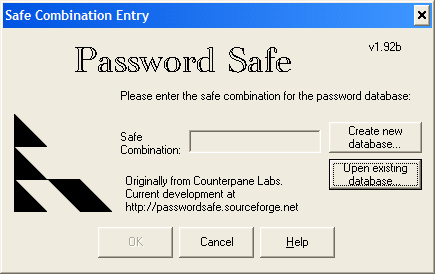
By itself, the VPN costs $96 yearly, so it's a huge bargain when bundled with Dashlane. That makes Dashlane Premium's $60 price tag well worth it if you need these extra services.

On the upside, the Dashlane Premium plan offers dark-web monitoring and unlimited VPN service, the latter courtesy of Hotspot Shield.
#PWSAFE FOR WINDOWS FREE#
Dashlane's free plan is limited to one device but it does let you store an unlimited number of passwords. Its Premium plan is $60 per year, or $78 per year if you pay monthly. A scanner also goes through your email inbox to find online accounts you may have forgotten about.ĭashlane's drawback is its high price.
#PWSAFE FOR WINDOWS PASSWORD#
The password manager is well designed, easy to use and excellent at filling out your personal information in online forms. Its killer feature remains a bulk password changer that can reset hundreds of passwords at once. I'd use 2FA authenticators more if I didn't have to re-set-up the tools every time I change computers/phones.Dashlane matches LastPass, 1Password and Keeper in platform support and has very intuitive desktop software. or I would find a standalone syncable 2FA device that could be paired with my new password manager.
#PWSAFE FOR WINDOWS ANDROID#
In an ideal world, this tool would also work as a 2FA authenticator tool that also syncs "secrets" (the damned QR codes, etc) among Windows / MacOS / Android devices via "cloud service that I control".
It's only a matter of time before some other tools see the cloud database where users' password vaults are stored compromised. The "via some cloud service that I control" is the critical bit.

Capability to sync among devices via some cloud service that I control (as opposed to a common repository).Easy access to secure random password generation.Runs on Windows, MacOS, and Android and can integrate with a common browser on all those platforms (ideally autofilling login and password information on demand).I have been considering alternatives, however.and still haven't found anything that has all the features I want: I'm still using LastPass, despite their security breaches, trusting that the long phrase I use as a password is sufficiently robust to provide protection for a few more years, since it's "included" with my antivirus tool. The strategy in red might well be the most valuable: " It is absolutely essential that you have a different password for every website you frequent." If you do this, when someone does get a hold of your hashed password, your potential exposure will be limited to one website (or whatever it is, some of us still use public access pubnix systems you know!) Your secondary effort, of setting strong passwords, will shield you from anything happening even on that one website.Ĭlick to expand.Thing is - if you want to follow the good-password practices of having strong passwords and having different passwords for each device/website, a password manager is about the only viable option for folks with non-eidetic memories. Then go and grab a beverage of your choice, sit back and enjoy your life without worrying.Īll things considered, security breeches happen all the time so the password strength recommendation is valuable. Follow the link, patronize hivesystems, they have some great info. In reality the time figures shown are based on several other things happening first (which also take time, skill, luck, etc.) If you're reading here, rest assured that the world hasn't gotten so insane that anyone can break in through the front door in seconds. An average user might believe that this chart means that a hacker can use software/hardware to break into an otherwise secure system through the front door in that amount of time, which is fantasy.

The web page provided at the bottom of the chart is very clear on the reality that password hash security is a secondary concern, the first concern being the security of the hashed password data itself. I like the colorful chart, but the utility in it is primarily its ability to grab attention.


 0 kommentar(er)
0 kommentar(er)
